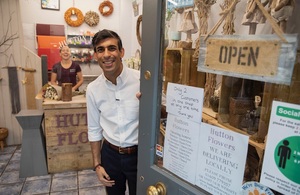Background
We are facing the biggest public health emergency in a generation. The COVID-19 challenge is global, and the UK is committed to a coordinated international response. We will be working together with governments, civil society, research-based organisations, and multilateral partners to support this global effort. The British Embassy Podgorica International Programme Fund supports projects aimed at COVID-19 response in Montenegro.
The Embassy calls for a new round of concept submissions for the current financial year (ending February 2021). We seek project proposals in line with the following objectives and priority areas.
Our aim
We are interested in project proposals that aim to deliver in the following areas and specifically support the COVID-19 response in Montenegro:
- Economic and socio-economic response, transparency or recovery;
- Promotion and protection of fundamental rights with regard to the epidemiological situation;
- Science, technology and innovation response;
- Health response, including vaccination, but excluding purchase of PPE and medical equipment for the treatment of COVID19.
Grants are awarded to civil society and local non-governmental organisations that have a proven record of accomplishment of implementation and delivery of projects in Montenegro.
Quality criteria
Irrespective of the project priority area, all projects must meet the following quality criteria:
Sustainability of the project’s results
The impact of a project should last beyond the life of the project itself. Applicants must clearly state which of the project outputs / outcomes are sustainable beyond the life of the project and how this will this be achieved in the course of the project.
Buy-in of the key beneficiaries / stakeholders of the project
An analysis of the project beneficiaries/stakeholders should be carried out during the preparation of a project, including consultations with the key beneficiaries / stakeholders. It should be clearly stated in the project proposal who the key beneficiaries / stakeholders of the future project are and the level of their support and buy-in to the project. We may require documentary evidence of this support.
Risk assessment
Project implementers need to demonstrate clearly how they would mitigate potential risks to project delivery. The aim is not to discourage high-risk projects, but to provide assurance that risk is systematically managed and properly escalated.
Timing
To apply for this funding, interested organisations must submit a project proposal and a completed activity based budget to the Embassy’s Project Section.
Project bids are required by 23:59 (Central European Time) on 5th of July 2020, sent by email which does not exceed 5MB in size.
Please use our standard Project proposal form and an Activity based budget Form.
All emails will be followed up by an automated system response, confirming your application has been received.
Management
Minimum size of the project proposals that are reviewed is 4,000 EUR, and the maximum size of the project proposals is 30,000 EUR. Co-funded projects are welcome.
The British Embassy Podgorica expects projects to commence in August / September 2020. Deadline for project completion is 1st of February 2021. We regret that we are unable to fund academic courses or research. If you would like some advice or guidance in advance of submitting the bids, please contact the Embassy’s Project Section.
Proposals will be assessed against the British Embassy’s priorities in Montenegro, and depend upon the funds availability. Only successful bidders will be contacted. Projects section will aim to contact all successful bidders by mid-July 2020.
Approval, contract and reporting
If the project is approved, the applicant will be given two copies of the contract, outlining the conditions of the grant. One signed copy must be returned to the British Embassy Podgorica.
The Embassy will require periodic financial reports and quarterly project progress reports from implementers. The first payment will be made upon the receipt of monthly financial report. When the project has been completed the implementer shall prepare and send a final report to the Embassy within the period specified in the contract.
If you would like some advice or guidance in advance of submitting the bids, please contact the Embassy’s Project Section.
